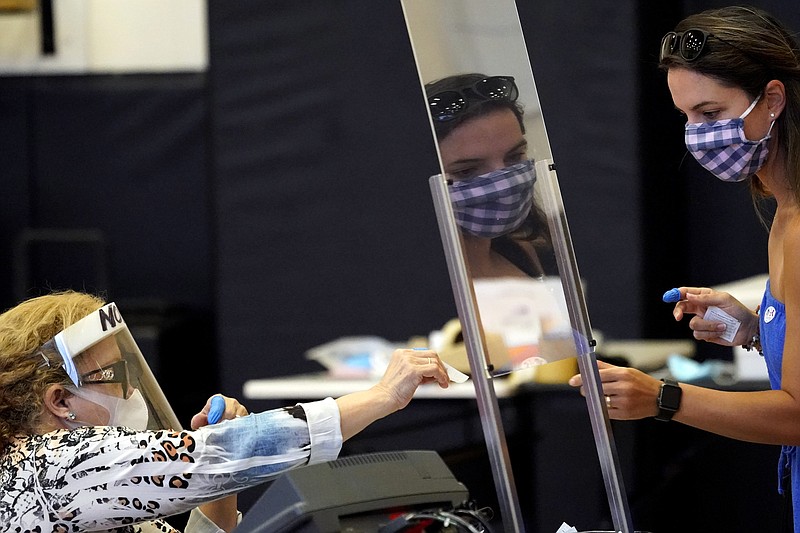AUSTIN, Texas -- The Texas Supreme Court ruled Wednesday that 2 million Houston voters cannot receive unsolicited mail ballot applications from elections officials who are dramatically expanding ways to vote in November in the nation's third-largest county.
The decision is the latest defeat in a string of losses for Democrats whose efforts to change Texas voting laws during the coronavirus pandemic have largely failed.
Texas is one of just five states not allowing widespread mail-in voting this year. Republican Gov. Greg Abbott has resisted calls to expand eligibility and courts have sided with GOP leaders who say fear of catching the virus doesn't qualify voters for mail-in ballots.
Abbott also continues facing lawsuits, including one filed Wednesday by the Texas NAACP, over his decision last week that barred Texas' 254 counties from operating more than one drop-off box for absentee ballots, which forced the closure of dozens of drop-off sites in Harris County and other Democratic-led counties.
Mail voting in Texas is generally limited to people 65 years old or older, or who have a disability.
"The question before us is not whether voting by mail is good policy or not, but what policy the Legislature has enacted. It is purely a question of law," the court wrote in its ruling.
Democrats, who believe this year's election is their biggest opportunity in Texas in decades, slammed the decision. "Once again, the all-Republican Texas Supreme Court steps into this election against the interests of voters and a functioning democracy," said Gilberto Hinojosa, chairman of the Texas Democratic Party.
Meanwhile, in North Carolina, a federal judge criticized an absentee-ballot procedure giving voters more leeway to fix incomplete witness information, but said he'd issue a written ruling at a later time.
U.S. District Judge William Osteen on Wednesday heard oral arguments in a tangle of lawsuits over how mail-in ballots will be processed. A key issue is how state and local elections boards should implement a state law requiring absentee voters to have an adult witness their ballots and provide the person's printed name, signature and address.
The state had recently developed a new procedure to allow voters to fix incomplete witness information by returning an affidavit to county officials, but not filling out a new ballot from scratch and having it witnessed again.
But Osteen said he has concerns that the procedure would essentially eliminate the witness requirement. He had previously ruled in August that the state had to ensure voters could fix certain deficiencies, but at the time he upheld the witness requirement in state law.
The procedure for fixing the ballots with incomplete witness information has already been temporarily halted pending Osteen's decision after GOP leaders challenged the new rules. But voting-rights advocates argue that thousands of ballots with deficiencies are essentially in limbo until a clear process is developed for handling them.
Osteen said at the end of Wednesday's hearing that he intended to issue a written ruling early next week.
In Indiana, a federal appeals court has rejected a lawsuit that aimed to make mail-in ballots available to all Indiana voters for the November election because of the pandemic, ruling that the limits included in state law don't violate voters' constitutional rights.
The record number of Indiana residents voting by mail this fall were warned to return their ballots in time to meet a noon Election Day deadline to be counted, as a judge in a separate lawsuit put an extension she had ordered on hold.
A three-judge panel of 7th U.S. Circuit Court of Appeals on Tuesday upheld a judge's August ruling that state officials had discretion in how to allow mail voting and that voters not wanting to cast ballots on Election Day could go to early-voting sites for nearly a month before then.
"The court recognizes the difficulties that might accompany in-person voting during this time," the ruling said. "But Indiana's absentee-voting laws are not to blame. It's the pandemic, not the State, that might affect Plaintiffs' determination to cast a ballot."
Voting-rights groups and both political parties have contested election rules in many states, with many lawsuits over expanding access to mail-in voting. More than 200 lawsuits have been filed across the country over voting procedures.
Information for this article was contributed by Acacia Coronado and Tom Davies of The Associated Press.
